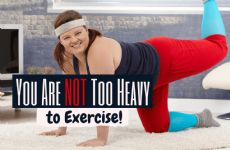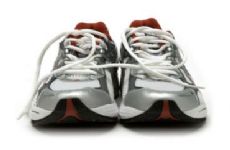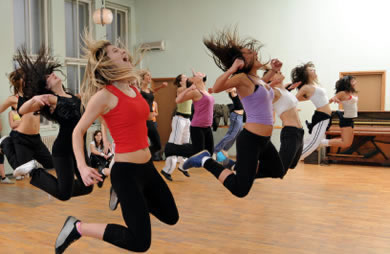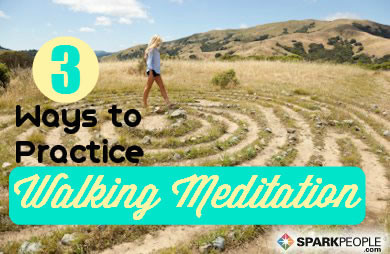|
We've all seen those enticing promises that (usually) fail to deliver, like: Get into a bikini by the weekend! Lose 20 pounds in a month! Reclaim your high school figure before the reunion! It's easy to fall into these traps and then feel bad about yourself when you don't achieve the promised results. At SparkPeople, we're all about embracing the summer of self-acceptance and finding things to appreciate about our bodies just as they are. At the same time, it's great to set improvement goals and strive for a healthier, more confident self. Heading into summer, many people enter panic mode at the prospect of being seen in a swimsuit. Or maybe there’s a big wedding coming up, and you're less than optimistic about that sleeveless gown that seemed like a good idea when you bought it last year. Summer is also prime season for family, high school and college reunions; boating trips; and beach vacations—all times when it's perfectly normal to want to look and feel your best. But what if your big event is looming a little too close for comfort—say, two weeks away? What if there was a way you could empower yourself right now to feel good instead of searching for the nearest hiding place? Obviously, it's not realistic (or safe) to drop double-digit pounds in a matter of days, nor will you be able to transform your natural anatomy (which is just as it should be). But that doesn't mean you can't squeeze in some quick fixes for noticeable changes and an added confidence boost. To find out the best ways to feel good now, we reached out to some fitness trainers and nutritionists who gave us the skinny on what's possible in a short amount of time. #1. Hit the water—hard. Hydration was hands-down the most common tip among our experts. Fitness trainer Brooke Markovich of Ledbetter recommends drinking eight cups of water a day and reducing sodium intake to prevent fluid retention and bloating. This will also help you feel fuller longer and curb cravings for empty calories. As an added bonus, water helps you put your best face forward. "When your body is properly hydrated, you'll have a wonderful natural glow—perfect for the beach," says Catherine Basu from FitArmadillo.com. "Water is also important for helping your body do its job of processing toxins and functioning properly." Carbonated beverages can cause bloating by trapping air in the belly, so pass on the fizz. It's also best to avoid artificial sweeteners, as sugar substitutes can cause bloating or water retention for some people. Swap out that sweetened iced tea or coffee for some plain H20, or add some lemon to your water. "Water with lemon is a natural and safe diuretic," says fitness and nutrition coach Kim Schaper. "The combo helps alkalize the body, flush out unwanted toxins, reduces the bloat and is high in minerals and vitamins." #2. Eat clean, nutrient-rich foods. The experts are unanimous: If you only have two weeks, your nutrition game plan must come first. Sarah Ann Kelly from MomTrainer.com recommends cutting back on sugars, starches and processed foods, and replacing them with lean proteins and fibrous vegetables. "If you can devote 80 percent of your diet to raw or unprocessed food, you'll feel leaner and will have less sugar cravings," Kelly says. According to nutritionist Mandy Unanski Enright, increasing your intake of fruits, veggies, whole grains and lean proteins will not only help you feel fuller and avoid snacking, but will also deliver a powerful boost of antioxidants that will keep you looking and feeling healthy. "A good goal is to have the lean protein take up 1/4 of the plate, grains another 1/4 and make veggies and fruit the star of the meal by taking up half the plate," Enright says. Working more veggies into your meals doesn't have to be a chore. "You don't have to just plop a huge side of spinach on your plate," Basu says. "Get creative and mix veggies into any meal. If you enjoy eating pasta and or rice-based dishes, fill them up with veggies. You could also add them to a breakfast omelet or dip them in hummus for a snack." Nutritionist Cheryl Russo suggests sticking with nutrient-dense foods rather than empty calories. For example, a big plate of leafy greens with three ounces of lean protein, along with some veggies or fruit, packs far more nutrients than a cheeseburger or processed deli meat with mayo on a roll. #3. Don't jump on the detox/cleanse bandwagon. It can be tempting to drink your calories for a quick weight loss boost, but most nutritionists advise against relying on detox diets and juice cleanses. "A juice cleanse can leave you feeling cranky and can actually sabotage your long-term goals," Basu says. "While it might help you lose a few more pounds now, rapid weight loss from a cleanse eats away at your muscle tissue, causing your metabolism to be slower in the long run and making it harder to lose weight in the future." Instead of smoothies and juices, she recommends sticking with fiber-rich fruits and veggies, which will keep you feeling full while boosting your energy and mood with essential nutrients. What about detoxes? Not necessary, Basu says. "Unless you have a non-functional liver, your body detoxes itself just fine." SparkPeople nutritionist Becky Hand steers members away from detox diets and cleanses. "On its own, a healthy body is designed to take care of toxins," she says. "Various detoxification programs, colon cleansing and water irrigation devices are not needed, and at times can be harmful or dangerous." Also, steer clear of crash diets. Russo warns against dipping below 1,200 calories per day, as that can cause your body to enter starvation mode and slow down your metabolism. #4. Skip the salt. Sodium, the main ingredient in salt, causes the body to retain water, which leads to bloating and puffiness. "While we do need salt (it's sweated out during exercise), we often have more than we need," Basu says. "Added salt will increase your hunger, thirst and cravings, and can derail your efforts to get bikini ready." When cooking, Schaper recommends swapping out salt for herbs and spices and avoiding processed foods, which can often contain an entire daily allowance of sodium in a single serving. Load up on high-fiber, high-water and low-calorie veggies, such as celery, cucumber, parsley, spinach and cabbage. To further your anti-bloating efforts, she suggests including plenty of potassium, which helps to maintain the water balance in your cells and wards off fluid retention. Another tip is to add ginger to tea, and add sliced fennel to salads or sandwiches to help fight bloating and improve digestion. #5. Get moving. Even in just two weeks, you can make a noticeable difference in your physique through daily exercise. "When you're trying for max results in a short time, cardio is your friend," says fitness trainer Samantha Bowman. If your schedule allows, get up early and start your morning with a cardio session. This can be running, walking, cycling or any activity that gets your heart rate up. If you're doing cardio on an elliptical or stairclimber machine, Bowman suggests adding resistance with an incline. "Don't hang on and lean back—use your legs and climb," she says. "You don't have to be fast to be effective. Add some intervals by alternating high resistance and high heart rate with low resistance and low heart rate. Keep some tension and resistance on the equipment. Do this either for 45 minutes or two separate sessions of 20 minutes." Can't spend that much time at the gym? Try sprinkling in shorter sessions of movement throughout the day. Basu recommends breaking up a goal of 30 minutes of walking into three chunks: one 10-minute walk in the morning, one during your lunch break and one before or after dinner. "Not only will moving more help you burn calories, it will also help boost your mood and motivation for all tasks," she says. Other ways to sneak in extra movement include taking walking meetings, parking your car farther away from entrances and even walking to work. #6. Welcome weights into your life. It's not too late to reap the benefits of strength training to firm up your muscles, Bowman says. If you don't have access to a personal trainer, hit the gym and make use of the weight machines. "Shoot for either three circuits or three sets at each machine," she recommends. "Increase weight after each set so that you're challenged to complete eight reps per set." Many people resist going heavier on weights because they're afraid they'll look bulky, but Kelly says the opposite is true. "Lifting heavier weights will give you a more sculpted and lean look," she says. "Plus, you'll burn more calories after your workout and boost your metabolism." If your gym has a wide selection of machines, Bowman suggests mixing up your muscle work. For example, you could do four or five upper body machines one day and the lower body machines the next day. Follow that up with a cardio day, and then repeat the cycle. To combat soreness and stiffness, drink plenty of water and stretch after workouts (and before bed). Also, be sure to eat lean protein after workouts for optimal muscle recovery. #7. Introduce intervals. While recent research has shown the weight loss benefits of Low Intensity Steady State (LISS) exercise, it's not the approach to take when you're in crunch mode. When you have only a couple of weeks, trade the long, leisurely walks for High Intensity Interval Training (HITT) workouts. HIIT switches between short bursts of intense cardio and short recovery periods, resulting in greater calorie burn in less time. "Interval training will definitely give you the most bang for your buck," says Russo. For muscle multi-tasking, she recommends doing compound exercises to work multiple areas at once while keeping the heart rate elevated. For example, you might do squats with a bicep curl, working the legs and arms at the same time, or a lunge along with a tricep extension. You can also combine core work with cardio. Markovich says circuit training is the best way to maximize caloric burn while incorporating both cardio and strength training. "Alternate between upper and lower body exercises throughout the circuit, a variation of circuit training known as the Peripheral Heart Action training system. PHA is particularly effective for burning more calories because it distributes blood between your upper and lower body extremities, forcing your blood to circulate faster." #8. Sleep it off. All this exercise and healthy meal planning is hard work, and your body will need some quality rest to recharge and refuel. "Sleep should always be a priority in taking care of your health, but especially right before an event or vacation where you want to look your best," Markovich says. "Not only will you look and feel more refreshed, but adequate sleep is necessary to keep your hormones in balance. Lack of sleep causes a spike in the hunger hormone ghrelin, which contributes to overeating and can sabotage your weight loss efforts." #8. De-stress. Ever noticed that you feel more bloated during periods of high stress or anxiety? Stress isn’t only tough on your mind—studies have shown that it may be linked to fat retention in the abdomen. To reduce stress-induced inflammation, Schaper recommends finding ways to relax and blow off steam, such as watching a funny movie, going for a walk, playing with your pet or reaching out to a friend or family member you've been missing. "According to Caroline Webb's book, How to Have a Good Day, you can decrease your stress by 27 percent by taking a short walk before and/or during work," Basu says. "Since stress can cause weight gain, combating it is an added bonus." That said, stress isn't always a bad thing. There are situations when it can actually give you the energy and motivation you need to push toward your goals. The key is finding the right balance between energized and overwhelmed. While they won't work miracles, these short-term strategies could produce some noticeable changes and give you a boost of confidence and energy. For long-term results, you'll need to stay consistent with a solid nutrition plan, regular exercise and quality sleep, well after your beach vacation or big event. What tips would you add to the list? |
Related Entries
More From SparkPeople
|


.png)


















